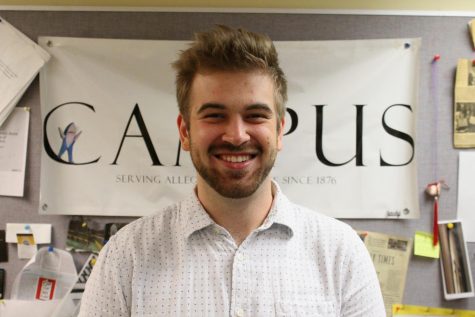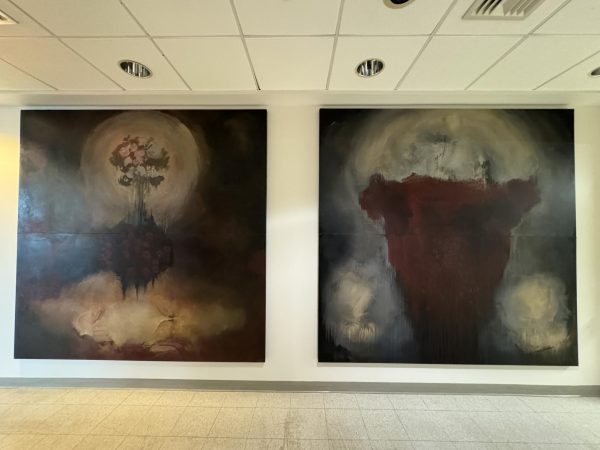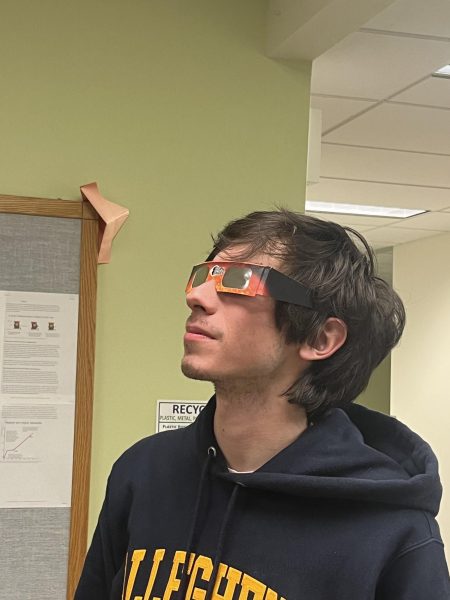Neuromarketing project ‘Judge the Nudge’ to be used in assisting COVID-19 safety plan
On Oct. 6, Gaia Rancati, visiting professor of marketing and neuromarketing, pitched a project to her neuromarketing class with the assistance of Priyanka Chakraborty, visiting assistant professor of economics.
Seeking to give their students experience, the professors found a way to implement their fields of study into current issues Allegheny College is facing in regards to COVID-19 safety regulations being followed by the college population.
“We are in the pandemic — this is kind of a big thing we have to consider,” Rancati said. “So I had an idea. I wanted to use the principle of behavioral economics to make (my) student(s) understand how we can nudge all the other students to follow the rules.”
The goal of the neuromarketing field is to study how people interact with the world and influence them towards a wanted outcome by applying neuroscience tools to marketing strategies, according to Rancati.
“I can try to understand if the product will be successful through traditional marketing research — surveys, questionnaires, focus groups and so on — or I (can) try to use some neuroscience tools, like eye tracking, heart rate (tracking), skin conductance, fMRI, EEG (to determine) if these product will be successful,” Rancati said. “Because these neuroscience tools are unconscious, you can’t lie.”
Once data is collected, neuromarketers create nudges — a type of messaging used to influence behavior and decision making — to attempt to change the result of an interaction or sway people towards or away from certain options. Rancati referenced hanging a poster near a stairwell that shows how many calories someone burns for each stair as a simple nudge. Other nudges can be as subliminal as placing healthier food near the front of the lines in a dining hall, influencing patrons to eat healthier.
“On campus, the rules are top-down — you receive the rules, you have to follow the rules,” Rancati said. “But our brain doesn’t work like this. If I don’t understand that these rules are important, I will not follow the rules. This is science. So I said, ‘why don’t we ask the students what we can do to make students follow the rules?’”
The project — called “Judge the Nudge” — required neuromarketing students to research and present nudges to Rancati, Chakraborty and others on Oct. 20. The best nudges will be implemented on campus throughout the rest of the semester and potentially into the future, according to Rancati.
“The goal of one student is presenting (their nudge) to a conference,” Rancati said. “But these students are also hired as research assistants, so they will be part of the lab.”
Rancati explained that the project was a fantastic starting point for neuromarketing at Allegheny.
“I came here to open, for the first time in Allegheny history, the marketing position,” Rancati said. “I’m the first professor of marketing. So I’m trying to build up, first of all, a neuromarketing lab, and I bought all the equipment.”
Within the neuromarketing lab, Rancati hopes to eventually have a more permanent lab set-up with more professional equipment.
“Right now, it’s five computers … and I have also bought software licenses for five students,” Rancati said. “So the students, through their computers, can work on the study. Plus, I have a sensor that can be moved (around) — it’s not a big thing. So far, I didn’t buy the EEG — that is the electroencephalography — because we need real space.”
Electroencephalography consists of connecting multiple sensors to the head of an individual with the purpose of monitoring abnormal brain waves and electronic signals, according to John Hopkins Medicine.
Rancati explained that student participation is important to her throughout both the project and the lab.
“What I can tell you for sure is that the student will be the protagonist for sure,” Rancati said. “Essentially I was outside in my backyard with (Chakraborty) — she has a PhD in behavioral economics — and I said, ‘You know what? I’m teaching neuromarketing, you are teaching behavioral economics. Why don’t we do something together? Why don’t we do something that makes sense for the student?’”
With complications of starting a new lab on campus, finding space for said lab and the ongoing COVID-19 pandemic, Rancati has many challenges in front of her, but she expressed hope for the future.
“When COVID-19 stops — hopefully — we will have a real space, a real room,” Rancati said. “What matters in life, though, is not a space. It’s people that believe in the project. As long as I have people that believe in the project, I have the lab. When there is a goal, when there are values and these values are common, you have a team.”

Roman Hladio is a senior from Wexford, Pennsylvania. He is studying English with a creative writing emphasis, and completing requirements for a Journalism...






